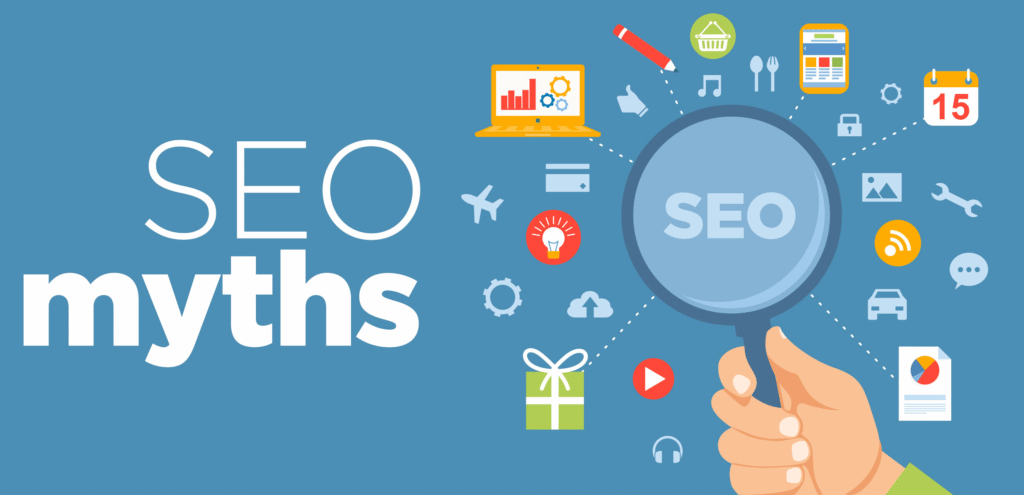Introduction
Search engine optimization (SEO) has become essential for any business wanting to grow its online presence and attract customers organically. However, the SEO landscape is full of misconceptions—many of which are still widely believed and practiced today. Following outdated or incorrect strategies not only wastes time and money but could actually be hurting your rankings.
At Dgital Marketing and Designing Company UAE, we work with clients across the UAE and beyond to correct these mistakes and implement strategies that actually work. In this blog, we break down five of the most common SEO myths and explain what you should be doing instead to stay ahead in 2025.
1. Myth: Keywords Are All That Matter
A decade ago, stuffing your web pages with a high volume of keywords might have helped you rank higher on search engines. But times have changed. Google’s algorithms are now far more advanced—they focus on understanding the intent behind a search, not just the words themselves.
Search engines reward content that’s natural, helpful, and contextually relevant. If your webpage repeats a keyword 20 times but fails to offer valuable information, your bounce rates will rise—and your rankings will fall.
What to do instead:
Focus on writing content for humans, not algorithms. Use keywords sparingly and strategically, and make sure your content actually answers the reader’s query. Use variations, related terms, and long-tail keywords to help search engines understand your topic better.
2. Myth: SEO Is a One-Time Fix
Many business owners believe that SEO is something you “set and forget.” You hire someone to optimize your site once and assume it’s good to go forever. But SEO is not a one-time effort. It’s an ongoing process.
Search engines are constantly updating their algorithms, competitors are adjusting their strategies, and user behavior continues to evolve. If your SEO stays static, your rankings will eventually decline—even if you once ranked on the first page.
What to do instead:
Maintain your SEO with monthly check-ins. Update old content, refresh title tags, fix broken links, monitor your performance, and adapt to algorithm changes. SEO is like a fitness program—the more consistent your efforts, the better the long-term results.
3. Myth: Google Ads Hurt Your Organic Rankings
A common misconception is that running paid ads through Google Ads can negatively affect your organic rankings. This is completely false. Google has stated repeatedly that paid advertising does not influence the organic algorithm.
In fact, running Google Ads can complement your SEO efforts. It increases brand visibility, drives more traffic, and allows you to test which keywords and messaging convert best—data you can then apply to your SEO strategy.
What to do instead:
Use Google Ads and SEO together. While SEO builds long-term organic visibility, ads give you immediate reach. Combining the two ensures your business appears in both paid and organic search results, doubling your chances of capturing traffic.
4. Myth: More Pages = Better SEO
It’s easy to think that having more pages on your website automatically improves your search rankings. But in reality, quality beats quantity every time. Filling your site with dozens of thin, low-value pages can actually harm your authority.
Google prefers websites that provide useful, comprehensive content that meets users’ needs. If your site has many pages with duplicate or shallow content, it may be penalized or ignored in favor of a competitor with fewer, better-optimized pages.
What to do instead:
Focus on creating high-quality content that addresses real questions or pain points your customers have. Group similar content together in topic clusters, use internal linking, and make sure each page has a clear purpose and SEO value.
5. Myth: You Have to Be #1 to Get Traffic
While it’s true that ranking first on Google gets the most clicks, it’s a myth that positions 2 through 5 aren’t valuable. In many cases, users scroll down and click results with better titles or more relevant meta descriptions—even if they’re not in the top spot.
Additionally, some searches display featured snippets, map listings, video carousels, and People Also Ask boxes. These all offer opportunities to drive traffic—even if you’re not ranked #1.
What to do instead:
Optimize for visibility and clicks. Write compelling meta titles and descriptions that attract attention. Use structured data to show rich snippets, and focus on user engagement metrics like time on page and bounce rate. These all contribute to improved SEO over time.
Conclusion
Don’t fall for outdated SEO myths that can slow down your growth. In 2025, success comes from a combination of user-focused content, consistent optimization, and strategic insights. Whether you’re just getting started or need to correct years of misinformation, our team at Dgital Marketing and Designing Company UAE can help guide you with proven, ethical SEO practices that actually work.
Want a free SEO audit? [Contact us today].




